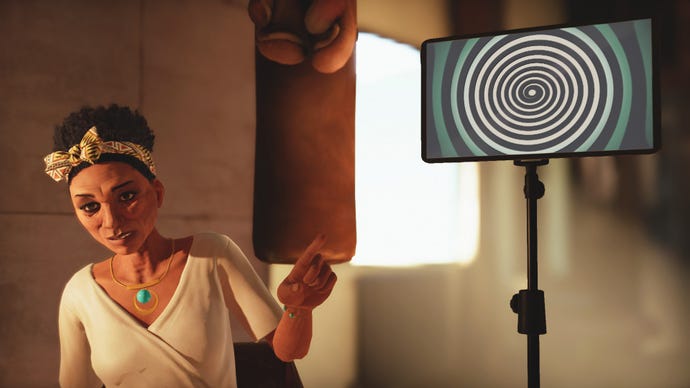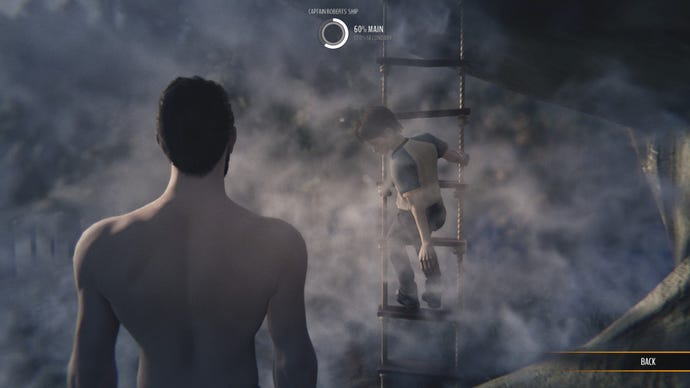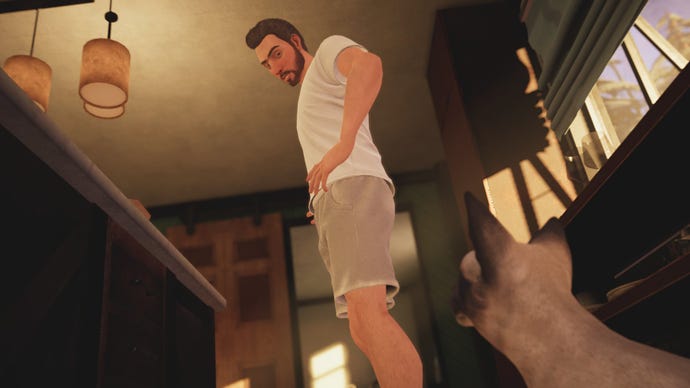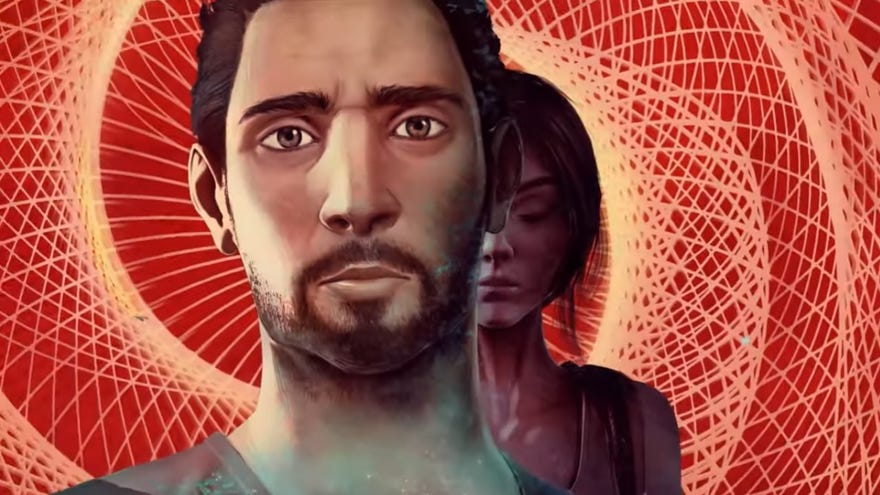Alfred Hitchcock - Vertigo review: a psychological thriller that falls short of true greatness
Question the “science,” stay for the hypnosis
I know almost nothing about Alfred Hitchcock. He’s the kind of archetypal director whose work I’ve been exposed to in bits and pieces without ever actually sitting down to watch one of his films in full. All of that is to say that, upon starting Alfred Hitchcock - Vertigo the game, I was in no position to judge whether it was a faithful adaptation of the film or to recognize all but the most obvious illusions to Hitchcock’s body of work (look, birds!). That’s okay, though, because as it turns out, Vertigo is an original story based on a collage of Hitchcockian concepts, not a direct adaption of the 1958 film by the same name.
Vertigo the game follows author Ed Miller as he grapples with a debilitating case of vertigo–a condition that leaves him unable to stand as the world appears to spin around him–and paralyzing guilt over the death of his daughter and her mother, Faye, after their car falls off a bridge into a ravine below. With Ed bed ridden, it’s up to Dr. Julia Lomas, psychologist and psychiatrist, and Sheriff Nick Reyes to unravel the mystery of what really happened, and whether Faye and his daughter even exist. My thoughts on how Vertigo goes about telling this story are... complicated.
The game opens with a barrage of quick-time events, and it doesn’t let up from there. While button mashing can be great for heightening the effect of already dramatic moments, Vertigo takes it a little far. Acts of no significance, like drinking a glass of water or feeding your cat, can require multiple inputs to complete. It's a similar deal to the stuff you find in Quantic Dream's games, but at times it almost feels like the developers were afraid someone would accuse them of having just made an animated Hitchcock spin-off instead of a video game if they didn’t make use of the joysticks at every possible opportunity.
Vertigo also contains a lot of disturbing moments that some players may wish to avoid entirely. These include initiating multiple suicide attempts, murdering a child, and one scene where, to progress the game, you have to drug another character in order to sexually assault them. Personally, I found gamifying these moments to be quite tasteless. They don't add anything to the story that a cutscene couldn’t have done instead, and the only thing they end up accomplishing is to make you feel extremely unpleasant.

This alone may be enough to turn some players off, but if you do decide Vertigo is for you, you’ll discover the real heart of the game: Dr. Lomas’ hypnosis sessions. During each of these scenes, Ed recounts a rose-tinted memory from his past before staring into a hypnotic app on Dr. Lomas’ tablet, at which point we’re plunged into the mists of memory to witness events again as they actually happened.
It’s an intriguing idea, as Ed appears first as himself in the past, and then as an outsider looking in from the present. The scenes from Ed’s childhood, where his pirate and secret agent-themed fantasies are shown to shelter him from the uncomfortable realities of his family’s life, are particularly endearing. I also can’t get enough of the purple fog that surrounds these scenes. It can be difficult to make a concept as ethereal as memory seem tangible to a player, but this effect really sells it. There’s no room for uncertainty in this hypnotic equation, though: in each instance, Dr. Lomas pushes Ed to remember what “really” happened to try and find "The Truth".
This wouldn’t be a problem if Vertigo went down the same route of games like Life is Strange: True Colors and Tell Me Why, all of which feature characters with superpowers doing impossible things. But Dr. Lomas doesn’t have superpowers, she has PhDs in psychology and psychiatry, and the psychology of memory is a lot more complicated than Vertigo makes it seem.

While it may have been reasonable for Hitchcock to take the concept of repressed memories at face value in the 1950’s, the idea that our brains contain secret black boxes of pristine information that only a psychologist can draw out of us is, at best, controversial. There's also a strong body of evidence to support how authority figures can, intentionally or unintentionally, encourage people to unknowingly create false memories of events that never happened. The use of hypnosis can make people even more suggestible, and therefore more vulnerable, to altering their memories to align with leading lines of questioning.
The existence of false memories doesn’t rule out the possibility of unconsciously repressed ones in and of itself, but, considering how much of Dr. Lomas’ contribution to the plot hinges on her supposedly empirical understanding of the human mind, Vertigo could have done more to acknowledge the ambiguity surrounding the scientific understanding of human memory. Again, if Dr. Lomas was written to have memory-manipulation based superpowers, none of this would matter. But by labeling its portrayal of memory as psychology rather than its own fictional magic system, Vertigo asks to be held to a higher, real world standard it doesn’t quite meet.
By labeling its portrayal of memory as psychology rather than its own fictional magic system, Vertigo asks to be held to a higher, real world standard it doesn’t quite meet.
There are dialogue options in which Dr. Lomas can interpret or react to what Ed is telling her, but as far as I could make out, Vertigo only has a single, linear pathway to a single, fixed ending, so ultimately these choices felt a bit meaningless. The possibility that Dr. Lomas could have accidentally influenced Ed’s perception of events, that he may genuinely have forgotten certain details, or may have simply been unwilling to openly discuss what he remembered all along, is never really considered.
Missing an opportunity for nuance doesn’t make Vertigo a bad game, but it does prevent it from becoming a better one that fully explores the complexity of human memory. As it is, Vertigo is probably best understood not as a reflection of how the psychology of memories actually works, but as an artistic metaphor for how revisiting childhood trauma as an adult can feel like a fundamentally life-altering experience.

And boy does Vertigo get into it. Ed, a successful writer who can (somehow) afford to live anywhere in the world, has chosen to build his mid-century modern bachelor pad on the bones of his childhood home. You can see the treehouse his parents built for him through the floor to ceiling windows in his kitchen. He could not be more clearly defined by, and yet in defiance of, his past. It’s fantastic.
Vertigo ultimately concludes that good can come from bad, and bad from good, through the simple fact that we are not our parents. But while Ed is revealed to be a complex and conflicted man molded by his past experiences, Vertigo falls short of offering the same level of grace to its antagonist. They are, in Dr. Lomas’ words, a “psychopath,” doomed from the start.
Like Ed, we’re also shown defining moments from their personal history, but these offer little insight into why they became the person they are today, painting them instead as a walking checklist for antisocial personality disorder. They lie, steal, manipulate, and torture other people and animals to achieve their own ends without the slightest twinge of consciousness - all things we knew about them already. It’s not until the final minutes of the game that Dr. Lomas reveals the truth behind this character in a flood of exposition, a violation she believes to have set all this behaviour in motion.

I won't spoil what this is, but I can't help feeling this revelation might have had greater impact if it had been brought up earlier instead of being tacked on at the end. This might have allowed the antagonist’s flashbacks to conduct a more thoughtful exploration of how trauma can draw some people into a cycle of violence and not others - a parallel that seems to exist between Ed and his antagonist on some level, but isn’t really followed through on.
As is, the sections focusing on the villain are basically just a psychopath simulator. There’s definitely some dark stuff in there and the characters have a real spark of life in them, but it doesn’t quite stick the landing - and that’s kind of how I feel about Vertigo as whole, too.

